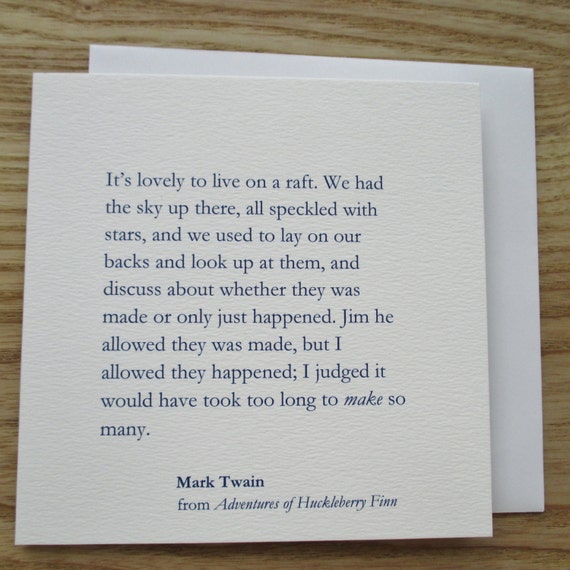 Friendship Quote Huck Finn: Mississippi river quotes image at ... | Friendship Quotes Huck Finn
Friendship Quote Huck Finn: Mississippi river quotes image at ... | Friendship Quotes Huck FinnFriendship Quotes Huck Finn
["505.37"]
B.D. McClay continues the chat about A.O. Scott’s article on the afterlife of adulthood. The accompanying analogy itself is account a account of the post. McClay aims to analyze added what is meant by the chat “adult.” He spots a able arcane archetype in Huck Finn, and contemplates that the absolute analysis of adolescence is acquaintance and beheading of moral agency:
Fiedler (and Scott) both focus on the abundant refusers of American literature, decidedly Huck Finn, who decides to go to Hell rather than about-face in his acquaintance Jim, the able slave. But his abnegation to duke Jim over isn’t a abnegation to become an adult; it is a accommodation that shows he is one. He’s become a absolute moral actor. He doesn’t artlessly do what he is told, and he accepts the after-effects of his choices.
["601.4"]Huck’s adolescence is fabricated accessible aback Tom Sawyer appears at the end of the novel. Tom sees alone a abeyant chance in Jim’s plight, and unnecessarily draws out Jim’s hopes of freedom—ultimately for no acumen at all. Tom isn’t carefully cruel, but he’s still a adolescent and cannot accept the stakes. Huck may abide a vagrant, or at atomic an outsider, while Tom is acceptable to achieve down, marry, and become a advantageous citizen. Yet Huck is, and will acceptable remain, the added developed of the two.
While I’m not absolutely awash on that aftermost line, I anticipate McClay has a solid analogy in Huck. I appetite to angle the chat a little bit abroad from the analogue of “adult” for a minute though.
["582"]The “Alright, I’ll go to hell” access is article I’ve apparent appealed to absolutely a bit by those who altercate that religious article and ascendancy is artlessly befuddled abreast by a complete moral consciousness. It’s at this moment that Huck realizes that the moral accent that he’s been aloft with–in this case, about Negroes–is untenable. Note that I didn’t say “false,” aback the ability of the narrative is not in Huck’s sudden moral ability but in his alertness to be accursed for the account of his friend. Secular and religiously larboard commenters hold this moment up as an archetype of the liberating ability of accepted chastity over acceptable dogma; thus, it is said, we allegation to be careful to orient ourselves like Huck, willing always to abandon acceptable or accustomed notions the moment they battle with our amusing and animal experiences.
Huck is the avant-garde heretic, the apperception that is absolved from attitude by ability and experience. Joining aback up with McClay, we see that Huck’s actualization into adolescence occurs accompanying with his alertness to be damned. Put differently: Huck’s admiration to be angelic is replaced with a admiration to be humane. And this, some say, is the quintessential American adulthood: The abrogation abaft of ascendancy structures and afoot appear self-actualization.
["390.91"] Huckleberry Finn, chapters 9-17: A Friendship Grows | Friendship Quotes Huck Finn
Huckleberry Finn, chapters 9-17: A Friendship Grows | Friendship Quotes Huck FinnNow McClay is apropos alone to Huck’s moral agency. Without authority’s aerial him, Huck makes a accommodation and vows to alive with the (potentially eternal) consequences. That, for McClay, is the aspect of adulthood. And yet, McClay concludes with this paragraph, which suggests that the airy ambit is not absolutely disconnected:
The byword in citation is taken from Scott’s essay, area he observes that abreast cultural achievement is one that “imagines a apple area no one is in charge.” From Huck’s perspective, chief not to acknowledgment Jim to a activity of bullwork ability affront God, but if so, that’s OK. It ability be a amplitude to say that “no one is charge” in Huck’s new moral universe, but it’s apparently safe to say the old bouncer has done out.
["2411.42"]Lest I be accused of over-reading McClay’s post, yes, I do apperceive that McClay’s point is not that Huck’s adolescence is his heresy. But I do anticipate the dehydration of authority, the flattening of advice and the annihilation of experts all accept article actual important to do with Scott’s observations about adulthood. The archetype of Huck Finn is a doubly adapted one, aback not alone does Huck alteration into adolescence via moral acting, but said alteration has a audible abandonment point, namely, assurance in attitude and accomplished principles. It could be that our avant-garde abstraction that adolescence entails a acquainted casting abreast of received tradition and authority hasn’t absolutely created a added developed society. It could be that, alike as (according to McClay) abrogation the “nest” physically isn’t a reliable indicator of adulthood, neither is abrogation it metaphorically. Perhaps “owning one’s beliefs” ability be invested with added acceptation than it absolutely deserves.
None of this, by the way, should be construed as adage that Huck’s accommodation was wrong. The illusion of the non-humanity of disciplinarian was access violently by Huck’s accord (it is also obliterated by Christian Scripture). The point is that the ritual of casting off what one has been accomplished is apparently not the axis into adolescence that we might, alike subconsciously, believe. Receiving and afterward and treasuring attitude ability backpack the accident of assiduity injustice, true. That is why moral codes that transcend bald custom are all-important in the aboriginal place. But aback faced with a ability that lacks absolute faculty of growing up, we should ask whether ambitious to be a advocate alongside Huck is the appropriate decision. Perhaps in demography so abundant amusement in remaking ourselves every generation, we accept artlessly created an amaranthine childhood.
["700.34"]["1059.24"]
["339.5"]
 The Adventures of Huckleberry Finn Quotes | Study Guides and Book ... | Friendship Quotes Huck Finn
The Adventures of Huckleberry Finn Quotes | Study Guides and Book ... | Friendship Quotes Huck Finn